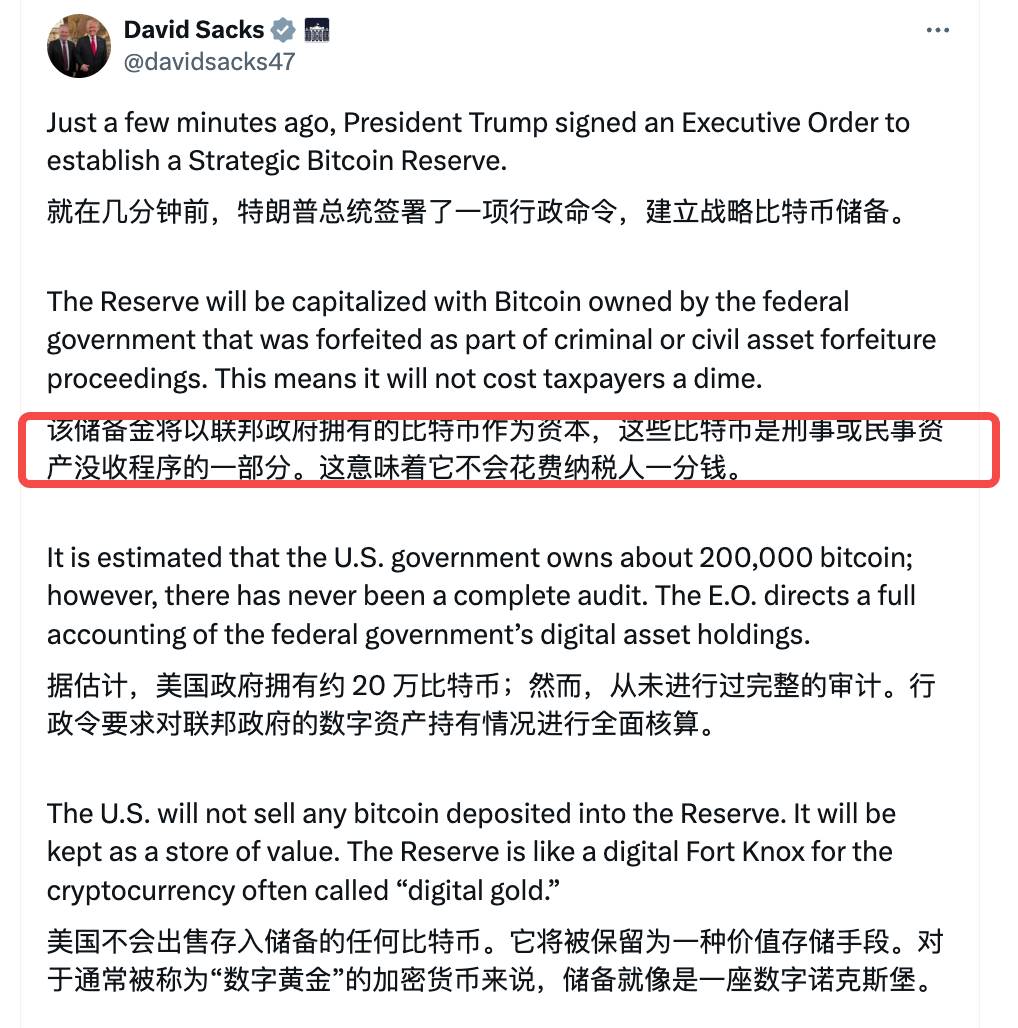It's not that we can't increase our holdings, but rather that we need to be more flexible in doing so.
Written by: Deep Tide TechFlow
Good news, Trump has signed the "Strategic Bitcoin Reserve" plan.
Bad news, it's not the kind of "directly spending money to buy more BTC" that you might imagine.
On March 7, former President Trump officially signed an executive order announcing that the United States will establish a "Strategic Bitcoin Reserve."
However, considering the policy details, things seem less optimistic than expected.
According to the policy content, the funding for this Bitcoin reserve does not come from direct purchases, but rather from Bitcoin obtained through criminal or civil asset forfeiture.
In other words, the U.S. government will not use fiscal funds or new tax revenues to purchase Bitcoin, but will rely on assets seized through judicial processes.

This clause has clearly disappointed the market, as it implies that the scale and speed of the reserve may be extremely limited, potentially failing to have a direct impact on the Bitcoin market.
After the policy announcement, Bitcoin's price also experienced a certain degree of decline, with some netizens even joking that everyone is being led by the nose by the policy, forming a "Trump market."

But beyond the general perception of underperformance, we should not overlook another key term in the policy --- budget neutrality.

This clause stipulates that when establishing the Bitcoin reserve, the U.S. government must ensure that it does not increase the burden on taxpayers; however, the Secretary of the Treasury and the Secretary of Commerce are authorized to develop budget-neutral strategies to acquire more Bitcoin.
This may seem like a limitation, but in reality, it opens up more possibilities for the execution of the policy.
Perhaps the true focus of this policy is not on the widely discussed "forfeited assets" or "reserve scale," but rather on the greater execution space of the "budget neutrality" strategy:
It's not that we can't increase our BTC holdings, but rather that we need to be more flexible in increasing them.
Budget Neutrality, Operational Flexibility
What does budget neutrality mean?
In simple terms, budget neutrality is a principle of fiscal policy that requires the government, when implementing new policies, not to increase the overall fiscal deficit or the burden on taxpayers. In other words, if the government wants to spend money, it must offset that expenditure by cutting other spending or increasing revenue.
In this Bitcoin reserve policy, budget neutrality means: the U.S. government cannot directly use the fiscal budget to purchase Bitcoin, but must ensure that the sources and expenditures of reserve funds offset each other through some form of "buy and sell."
This is precisely why the policy mentions that the initial funding source for the Bitcoin reserve will rely on Bitcoin obtained through criminal or civil asset forfeiture.
However, it is important to note that budget neutrality does not mean the government is completely unable to increase its Bitcoin holdings through other means. In simple terms, it's not a matter of "not being able to buy," but rather "how to buy."
Budget neutrality designs a "closed-loop" logic for the implementation of the policy: any new Bitcoin reserves must be achieved through the reallocation of other assets or resources. This mechanism opens up multiple possibilities for the execution of the policy:
- Achieving reserve goals through asset swaps, such as gold
For example, the government could sell existing reserve assets (such as gold, treasury bonds, etc.) and use the proceeds to purchase Bitcoin. In this way, while the Bitcoin reserve increases, the overall asset scale does not expand, thus meeting the requirements of budget neutrality.
- Directly incorporating Bitcoin obtained through judicial forfeiture into reserves
The government can use Bitcoin seized through judicial processes as a source for reserves. This method avoids fiscal expenditure, but the scale of the reserve entirely depends on the quantity of judicial forfeitures, which carries significant uncertainty.
- Monetizing resources or redistributing revenues
The government can also monetize other resources (such as energy, land, etc.) and use the proceeds for Bitcoin reserves. For example, utilizing idle energy resources for Bitcoin mining, or selling certain non-core assets to exchange for Bitcoin.
This "buy and sell" logic is both a constraint on fiscal discipline and a blank space for operational flexibility in policy execution. It ensures that the government does not increase the fiscal deficit by increasing Bitcoin holdings while also designing multiple paths for the specific operation of the policy.
Is the impact of not directly buying BTC being underestimated?
You might ask, since the U.S. government wants to establish a strategic reserve, why not simply increase the budget to buy BTC and make it so complicated?
Firstly, it may be to avoid market panic.
If the government were to directly use the fiscal budget to purchase Bitcoin on a large scale, it could raise concerns about the credibility of the dollar and even create inflationary pressures. Budget neutrality, through the "buy and sell" method, avoids the risks of new fiscal expenditures and can advance the policy more smoothly.
Secondly, it explores the possibility of asset restructuring.
Budget neutrality provides the government with an opportunity to reallocate existing assets. For example, by selling gold reserves to acquire Bitcoin, or exchanging other resource reserves for Bitcoin, adjustments can be made more flexibly based on market prices and international situations, achieving the goal of optimizing asset structure, and allowing for more "agility" in international relations and asset competition.
The key point here is: budget neutrality does not exclude the government from actively increasing its Bitcoin holdings, but rather requires achieving reserve goals through some form of "old for new" or "small for large."
The current disappointment in the market is likely due to overlooking the flexibility hidden behind budget neutrality. In fact, this clause not only does not limit the execution of the policy but also opens up more possibilities for it.
Given the unpredictable nature of the former president, this also gives him more space for "the interpretation rights belong to me."
However, at present, the market's reaction seems to show insufficient interest in this policy, with both gold and Bitcoin prices declining after the policy was announced.

Peter Chung, head of research at Presto Research, pointed out in a post that "BTC has not shown a positive response, indicating that there is a certain amount of 'Buy the Rumor, Sell the News' activity in the market."
This short-term fluctuation may reflect a misunderstanding of the policy logic by the market.
The market originally expected the U.S. government to directly use the fiscal budget to purchase Bitcoin, a method that would not only quickly expand the reserve scale but also create significant buying pressure, driving up Bitcoin prices. However, the policy chose the "budget neutrality" approach, which in the short term was interpreted as "insufficient strength," leading to selling sentiment.
In fact, budget neutrality does not mean a weakening of policy strength, but rather provides greater flexibility for policy execution. As the policy terms indicate, the Secretary of the Treasury and the Secretary of Commerce are authorized to develop various strategies to acquire Bitcoin reserves, and this "old for new" or "small for large" approach may release greater potential in the future.
In the short term, the market is more focused on the scale and speed of Bitcoin reserves, and the current price performance not meeting expectations is also understandable.
However, long-term macroeconomic changes should not be overlooked.
If the U.S. government gradually increases its Bitcoin holdings through budget neutrality, it will send a solid signal to the market: Bitcoin is transitioning from a "speculative asset" to a "reserve asset." This signal may prompt other countries to follow suit, accelerating the globalization process of Bitcoin.
Especially if the U.S. government really exchanges gold for Bitcoin, this asset swap behavior will further solidify Bitcoin's position as "digital gold," laying the foundation for its role in global reserve assets.
As a bellwether, the U.S. government's actions may also trigger a chain reaction internationally, with other countries potentially emulating this model, promoting the diversification of global reserve assets.
When everyone believes that Bitcoin should become a type of asset reserve, the method of how to reserve it seems to become less important.
From a small-scale geek experiment to where we are today, the crypto industry has indeed come a long way; moving towards the mainstream amidst controversy is something every BTC holder should be happy about.
免责声明:本文章仅代表作者个人观点,不代表本平台的立场和观点。本文章仅供信息分享,不构成对任何人的任何投资建议。用户与作者之间的任何争议,与本平台无关。如网页中刊载的文章或图片涉及侵权,请提供相关的权利证明和身份证明发送邮件到support@aicoin.com,本平台相关工作人员将会进行核查。



